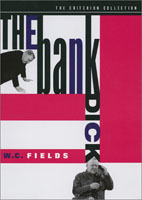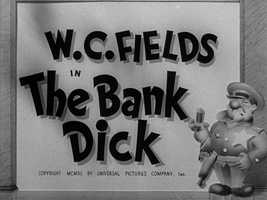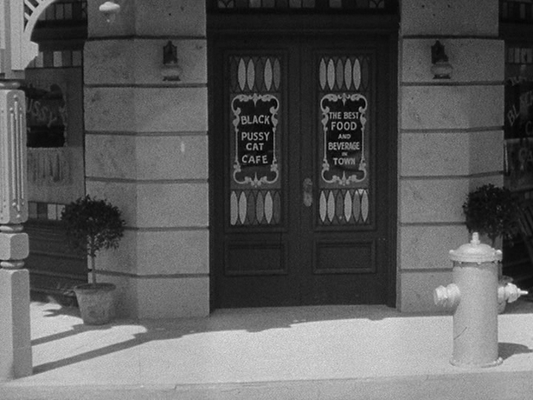directed by Edward Cline
written by “Mahatma Kane Jeeves” (W.C. Fields)
2000:  (out of print September 2004)
(out of print September 2004)

Criterion #78.
After decades of fake W.C. Fieldses, I finally saw the real thing. And sure enough, it’s a thing that cries out to be imitated. This is a man who deliberately rendered himself impression-worthy. Insofar as his caginess and cruelty and melodious drawling is a vaudeville act, I’m all for it. There’s something inspired and almost hypnotic about the way the “W.C. Fields” schtick is glum and gritty yet at the same time, in its elocutional filigree, airy and unreal. It feels to me like a holdover from a 19th-century sense of humor; it has something of the Mark Twain school about it. I enjoy getting that kind of Rosetta Stone access to the entertainment culture of a more distant past, since pre-20th-century humor can often seem like an uncrackable nut.
However, in this particular movie — Fields’s second-to-last — I couldn’t find any real mirth. Even when in theory I liked the material and endorsed the idea of “W.C. Fields” doing it, I was still saddened and oppressed by the fact that the man onscreen was so obviously a genuine depressive alcoholic, doing his murky best to stay on the ball and give the people what they came for, even though by this point in life his drinking had mostly consumed him. All his physical comedy is artifical and inexpert; all the verbal play comes across as slack and distracted. His performance is generally labored and sloppy.
But mostly the problem is his eyes. You can barely see them; they’ve been swallowed up by the heavy mask of impassive meat that his face has become. How can there be comedy without eyes, without openness? He’s presented as some kind of protagonist, an antihero or a clown or something, but all I can see is the deadening sadness that’s turned him into an inexpressive pigface. He can’t even rate “buffoon”; he’s too far away. This is someone who has fled almost completely into his interior, out of sight. Look: even the cartoon Fields in the title card above has no eyes, or soul, to speak of. He’s just an outline with a big nose. The movie shuttles this expressionless caricature back and forth like a paper doll, in apparent attempt to generate Laffs by static electricity.
Shemp Howard is in the movie, playing the bartender (and occasionally whistling the Three Stooges theme): another face like a slab of beef, always depressing to me for the same reasons. The eyes of the Three Stooges are spiritually drained, inexpressive, even when they’re pulling “wacky” faces. There’s no disguising that they are utterly walled-off inside, even from their own comedy. The very fact that there is a wide audience of people who chortle and cheer at their dead-eyed simulacrum of zaniness — or for that matter at The Bank Dick, which is in fact quite beloved — saddens me in itself. Why can’t people see what I can see, that this is all a grim charade by a bunch of guys who aren’t fully present? I get scared that it’s because my fellow audience members are dead inside too, and so can’t afford to distinguish between a person and a “person.” I don’t want to go among such people.
This movie had that heavy working-class feeling of rough, narrow laughter emanating from a resentful worldview. The most famous line from the movie is, apparently, this one, where Fields asks the bartender:
I can hear that it’s a well-formed vaudeville joke in the classic style, that it’s pleased with itself and confident as such… but I’ve been over this many times in my head and I just don’t think it’s actually as funny as the delivery (and fame) seems to imply. At a Chico and Groucho pace, rattled off in 6 seconds, I could get behind this as a cute twist punchline, but drawn out to 15 seconds as it is, it feels like the emphasis is on the real substance, on the psychology and character of this man for whom a memory-erasing $20 bender ($20 1940 = $335.44 2015) is a matter of course. I stop wanting to laugh, and I start getting uncomfortable with the people who do, who want to spend 15 seconds in this self-destructive space.
Try saying “One morning I shot an elephant in my pajamas. How he got in my pajamas I don’t know” — but take 10 seconds to do it. The joke disappears and the line becomes sort of ominous, doesn’t it? What’s wrong with this man? What is he getting at?
(I just had the impulse to check the two deliveries against a metronome. Groucho’s pacing is, to my ear, very clearly at 80 bpm. W.C. is doing 48 bpm.)
W.C. Fields in this movie feels to me very close to the line of personhood throughout, but usually on the wrong side of it. I was always rooting for him to really show up and spit poison, or honey — or deadpan pointedly — but it never quite happened. His eyes never sparkle and back up the persona. He just sort of drifts around like an alcoholic. An actual alcoholic.
Of course, all these kinds of fears and sadnesses are just my own personal burden and may not have to do with anything real. It’s possible that The Bank Dick will seem inoffensive and amusing somewhere down the line when I’m in a different state of mind. But I don’t think I’m wrong in being aware that this is W.C. Fields past his prime and trying to hold it together. Probably it would have been better to start with his earlier work and develop a sense of trust in him as a performer before getting into this late stuff. On the other hand, perhaps it was good to start here — now everything else will seem lively and vigorous by comparison. Maybe.
We’ll see very shortly!
To be fair, there’s some lightly funny stuff. I liked the “hearty handclasp” and the “paisley shawl” and the silly names. I liked when Una Merkel comes in at the beginning and nasals “hello” to everyone. She seems to be amusing herself. (The maid from The Parent Trap! Boy, I would never have been able to come up with that.)
It could have been worse. Maybe someday I’ll be sleepier and it will come on TV and all seem hilarious.
Connection to the preceding: gosh, this is hard. I just barely retained the preceding movie.
They each star a screen icon much better known for being “a screen icon” than for any actual work he/she did.
That’s lame but it’s what there is.
The Criterion disc has no bonus features whatsoever. Furthermore it’s been OOP since 2004 and is unavailable from any of my sources. Given these two facts I have allowed myself absolutely unprecedented license and watched this movie on the currently available non-Criterion edition. Insert as many exclamation points here as you feel are merited, and then please do compare closely and see if you don’t agree that in this case the substitution was indeed harmless.
Except of course for the harm done to my integrity, my reputation, my trust. From here on down the slippery slope, you’ll no longer be able to believe me when I post about Criterion movies. For all you know I may not even have watched them.
But heck, maybe I haven’t actually watched any of them thus far, either, and have been making up all these “responses” out of whole cloth! That would be quite a twist.
The only music credit is Charles Previn as “musical director.” Charles Previn (André’s great uncle) was head of the music department at Universal, with a stable of staff composers working under him. The word online seems to be that most of the music in The Bank Dick is actually by Frank Skinner (1897–1968), and that some, or maybe all of it, is tracked from other movies.
As far as I can ascertain, the following Main Title is unique to this movie and is probably by Skinner, but these things aren’t well documented. From the sound of it, this piece could just as easily be “Comedy Loop #34” from the Universal library — it sounds a lot like newsreel music. It certainly does not sound like the The Bank Dick, which neither hustles nor bustles.
That all said, I do generally enjoy that old Hollywood newsreel library music — an endless cavalcade of Allegro moderato — and wish there were albums of it. It’s the American spiritual state of the era encapsulated: “well now!” Its vagueness, the way it combines complacency with excitability, is intriguing to me. So I’m quite happy to be adding this track to my Criterion master playlist.
As you’ll hear, I’ve broken another of my protocols, and allowed dialogue into this one. Mostly it’s because I didn’t have a choice, but it was easy for me to rationalize it; for the real vaudeville atmosphere I think a little spoken-word is quite in order. Here we hear two passersby observing our hero’s name on the mailbox.
The “accent grave,” which is a running gag throughout the film, is a big (sic); it’s of course actually an accent aigu on “Egbert Sousé.” Did Fields know? He may have and just not cared. Certainly he was right that “accent grave” is a very W.C. Fieldsy thing to say over and over. Go ahead and try it.
